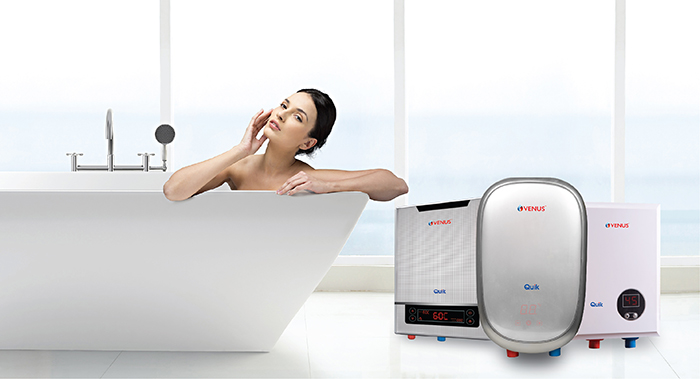This article in the next paragraphs involving Six Benefits of a Tankless Hot Water Heater is rather intriguing. Have a go and draw your own final thoughts.

In a world where benefit and efficiency preponderate, it's no surprise that house owners are continuously in search of smarter methods to manage their home's power consumption and convenience. One development that has actually progressively obtained popularity is the tankless water heater. However what exactly makes these systems stand apart from the standard tank-based designs most of us grew up with? Let's dive in and discover the advantages of tankless water heaters, helping you determine if it's time to make the switch in your home.
Introduction
Picture this: you enter the shower after a lengthy day, anticipating a soothing waterfall of warm water, only to be greeted by icy beads due to the fact that the last individual utilized all of it up. Sound familiar? Traditional water heaters store a fixed amount of hot water, implying you're at the grace of that container's supply. Tankless systems, on the other hand, warmth water on demand. No more going out mid-shower, say goodbye to wrestling with schedules simply to guarantee hot water is available.
Recognizing Tankless Hot Water Heater
What Are Tankless Water Heaters?
Tankless hot water heater, sometimes called on-demand or immediate water heaters, give hot water only as it's needed. Rather than storing gallons of pre-heated water, these devices kick into activity the minute you activate the tap. Water goes through a warm exchanger, heating up in real-time, indicating you obtain a continuous flow of hot water without the demand for a huge container sitting lazily by.
How Do They Vary from Typical Solutions?
Conventional heating units hold a storage tank of hot water, making use of energy to maintain that storage tank at a consistent temperature. Tankless systems remove the standing supply, lowering thrown away energy and the large impact of a large cylinder. Basically, you're upgrading from a "accumulation" frame of mind to a "made-to-order" method.
Typical Kinds Of Tankless Systems
Tankless water heaters typically are available in 2 selections: gas and electric. Gas versions have a tendency to supply higher circulation rates, ideal for larger households, while electric versions commonly offer smaller sized homes and are normally less complicated to install. Furthermore, some systems are made for point-of-use (offering one component) while others can take care of the whole home's warm water demands.
Secret Advantages of Tankless Hot Water Heater
1. Endless Hot Water Supply
Ever before had to arrange showers so everybody gets their reasonable share of hot water? With tankless, that comes to be a thing of the past. As long as the heater's flow capability isn't exceeded, you can take back-to-back showers without becoming a popsicle.
2. Power Efficiency and Price Cost Savings
No more heating up a giant tank's well worth of water and keeping it toasty all day. Tankless heating systems lower standby power losses, which can decrease utility bills. While the initial price might be higher, the lasting savings typically warrant the investment.
3. Space-Saving Style
If your home is short on storage space, removing the large container maximizes useful space. Tankless devices are small and can often be installed on walls, hidden in edges, or installed in tight energy storage rooms without having all to oneself the entire space.
4. Longer Life expectancy
A properly maintained tankless water heater can outlive its tank-based relative. Conventional storage tanks might last 10-15 years, while tankless designs can keep chugging along for two decades or even more, making them a strong financial investment gradually.
5. Improved Water Top Quality
Saving water in a tank can often bring about debris buildup or a slightly "off" taste. With tankless systems, fresh water is warmed right away, reducing the opportunities of sediment accumulation and possibly offering cleaner-tasting water.
Factors to consider Prior To Switching
Though the benefits are engaging, it's important to consider a few aspects prior to totally committing.
First Financial Investment Expenses
Tankless heating units usually come with a higher ahead of time price. Between the system itself and possible setup alterations, the first expense could offer you sticker label shock. However remember to view it as a lasting investment.
Setup Needs
Relying on your home's framework, you might need added electrical capability or gas line upgrades. Ensure you recognize the installment requirements and talk to an expert to avoid shocks.
Evaluating Your Home's Water Usage Patterns
If your home simultaneously uses multiple fixtures with high hot water demand, see to it the system's flow price fulfills your needs. Recognizing your usage patterns helps you select the right size and sort of tankless heating unit.
Maintenance and Treatment Tips
Tankless systems are relatively reduced maintenance, however they aren't set-it-and-forget-it home appliances.
Routine Cleaning and Descaling
Difficult water minerals can develop in the heat exchanger, impacting effectiveness. Regular descaling (commonly advised yearly) maintains the system going for peak performance.
Yearly Specialist Examinations
A yearly checkup from an expert makes sure small concerns are caught early. They'll analyze the unit's performance, look for leaks, and assist preserve optimal efficiency.
Guaranteeing Proper Ventilation
For gas versions, proper ventilation is necessary to securely eliminate exhaust gases. Ensure airing vent systems are clean and properly set up to stop any type of potential safety threats.
Comparing Different Brands and Models
Not all tankless hot water heater are created equivalent.
Investigating Dependable Makers
Seek respectable brands with a background of producing top quality units. A reputable producer commonly provides much better customer support and longer service warranties.
Checking Out Testimonials and Individual Responses
User reviews and responses from next-door neighbors or friends who have gone tankless can provide useful understandings. In some cases, real-life experiences can be extra informing than advertising and marketing pamphlets.
Installation: DIY or Specialist?
While some house owners relish tackling jobs themselves, tankless setup may not be the very best time to break out the tool kit.
Benefits and drawbacks of Do It Yourself Installation
A do it yourself set up could save money, but it includes risks. Incorrect setup can result in inefficiency or safety worries. If you come in handy and have experience, it could be practical-- however wage care.
When to Call a Specialist Plumbing Technician
For the majority of, calling a pro makes sure every little thing's done properly. An expert plumbing professional recognizes local codes, sizing requirements, and airing vent criteria, decreasing the danger of mishaps.
Making best use of Efficiency
You've bought a tankless system-- currently optimize its performance.
Optimum Temperature Level Setups
Most individuals establish their systems in between 120-140 F. Adjusting the temperature can improve comfort and savings. Experiment to locate a sweet place that does not throw away energy.
Pairing with Low-Flow Fixtures
Want to stretch your unit's capabilities? Take into consideration mounting low-flow showerheads and faucets. They lower water use, permitting your tankless system to supply a steady stream of hot water without stressing.
Ecological Effect
Tankless water heaters straighten with greener living objectives.
Lowered Carbon Impact
By using much less power and just heating water as needed, tankless systems can decrease your home's carbon footprint, minimizing your environmental influence.
Conserving Natural Resources
Less power intake and less wasted hot water convert right into less natural resources being used, an ecological win-win.
Who Profits Most from Tankless Heaters?
The appeal of tankless heating systems is that they can match a range of families.
Big Households vs. Solitary Occupants
Large families may love the limitless warm water supply, while solitary occupants appreciate the power financial savings from not warming an entire container for just someone's morning shower.
Home Owners with Limited Room
If your home is short on square video, losing the bulky storage tank frees up space for other fundamentals-- or maybe just extra elbow room.
Eco-Conscious Customers
Going tankless aligns with eco-friendly values, ensuring you're not wasting power or resources.
Future Patterns in Tankless Water Heaters
The globe of home devices is ever-evolving, and tankless water heaters are no exemption.
Smart Home Integration
Picture adjusting your water heater's temperature level by means of an application or receiving upkeep alerts on your phone. As clever home tech advances, we'll see even more connectivity and benefit.
Innovations in Innovation
R&D is frequently enhancing warmth exchangers, making devices a lot more effective and durable. Future models might be also quieter, extra compact, and far better matched for varying climates.
Verdict
Choosing a tankless water heater is more than just updating your home's hot water system; it's purchasing long-term comfort, energy effectiveness, and a greener way of living. By considering your household's water usage, being mindful of installment demands, and dedicating to routine maintenance, you can delight in a stable stream of hot water without the baggage of a large container. As modern technology progresses, you can look forward to also smarter, extra reliable tankless options that not only make your life easier yet likewise benefit the earth.
Pros and Cons of Tankless Water Heaters
Tankless Water Heater Pros
- Saves Energy: Simply put, you re spending less energy to create hot water, so your total carbon footprint goes down, not to mention your bills.
- Lasts Longer Than Storage Tanks: Storage tank units need to be replaced every 15 years or so. But tankless units? They can last for 30 years before they give out on you.
- Constant Hot Water: Need to take a shower and don t want the water running cold? Awesome it won t. The water will stay hot the entire time because it creates hot water on demand.
- Saves You Money: Less water usage equals less money. Beyond that, you re not paying to keep water hot 24/7. Those savings add up quickly.
- Better for the Environment: Less water waste is better for everyone. It saves you money, but it s also environmentally conscious at the same time.
Tankless Water Heater Cons
- It Can Take a Minute: Depending on your specific unit and its placement, it can take anywhere from 10 seconds to 2 minutes to fully heat up. Because there s no storage tank, it heats water as you need it.
- Upfront Purchase Price: While we talked about their longevity, there s sticker shock when you look at brand-new tankless units to install. It pays for itself, but it s still a big chunk of change at first.
- Has its Limits: If you run multiple appliances at once, such as the dishwasher, washing machine, and maybe you take a shower at the same time, there might not be enough hot water.
https://www.airsouthnow.com/blog/water-heater-service/pros-and-cons-of-tankless-water-heaters/

I ran across that piece of writing on Why You Should Consider a Tankless Water Heater while looking around the web. You should take the opportunity to share this blog posting if you liked it. Thanks a lot for your time. Return soon.
Course Detail
Comments on “Essential Benefits Families Obtain From Tankless Water Heaters”